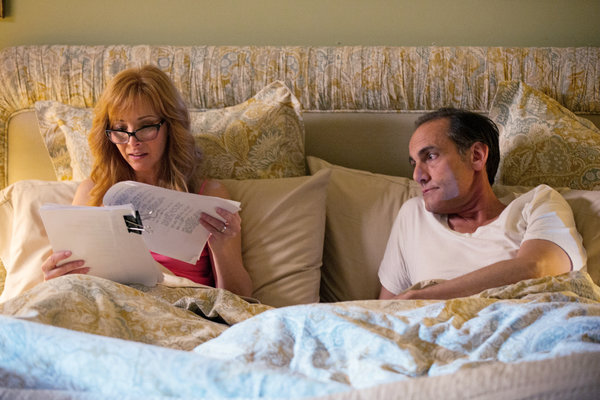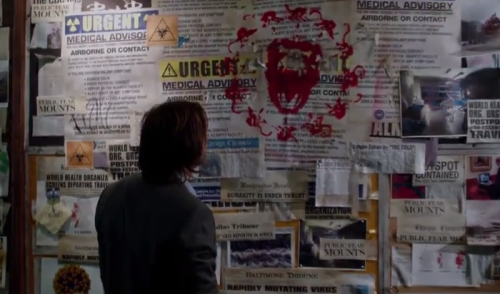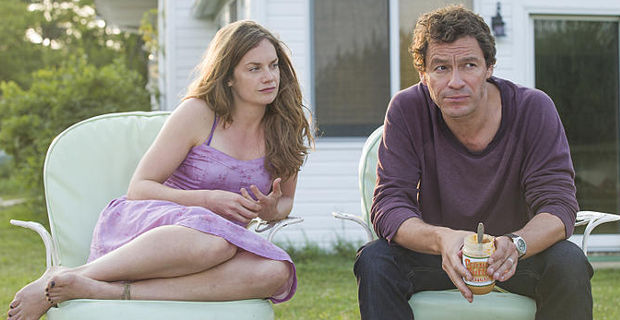2013 Emmy Dream Ballot
by June 23, 2013 12:18 pm 599 views0

 Even in years where my favorite shows aren’t in contention, the television awards season tends to be pretty fun. You have unexpected shows and performers that earn themselves promotion due to being in the awards conversation, while Twitter shines during live events like the Primetime Emmys and, as in sports like college basketball, a lot of enjoyment simply comes from predicting what will happen. Although I’m not enough of an awards buff to (publicly) predict what I think will happen come nomination morning (July 18th), there’s nothing wrong with sending a little positivity out into the world and help out the contenders that I feel have more than earned a shot at being recognized for their work. Therefore, I’ve put together what would be my dream ballot – if I could have the 2013 Primetime Emmys any way that I want, this is what the main categories would look like, basically.
Even in years where my favorite shows aren’t in contention, the television awards season tends to be pretty fun. You have unexpected shows and performers that earn themselves promotion due to being in the awards conversation, while Twitter shines during live events like the Primetime Emmys and, as in sports like college basketball, a lot of enjoyment simply comes from predicting what will happen. Although I’m not enough of an awards buff to (publicly) predict what I think will happen come nomination morning (July 18th), there’s nothing wrong with sending a little positivity out into the world and help out the contenders that I feel have more than earned a shot at being recognized for their work. Therefore, I’ve put together what would be my dream ballot – if I could have the 2013 Primetime Emmys any way that I want, this is what the main categories would look like, basically.
A few caveats, though. I don’t (read: physically/mentally can’t) watch every worthy show on television, so the exclusions you’ll see aren’t indicative of my attitude toward a certain show. More than likely, I simply don’t have/haven’t had the chance to watch and didn’t feel comfortable in putting them on my “dream ballot”, but I feel like I watch enough of the big shows to be able to write a piece like this. The nominees have been constructed using the Emmy ballots that were recently released; you may quibble about category placement, but I’m merely going by how everything was submitted rather than my view on the tone (comedy vs. drama) or depth (lead vs. supporting) of the show or performance. I mainly focused on the major categories (series, lead/supporting acting), as my directing knowledge isn’t great, there might not be much interest in smaller categories, and I haven’t watched enough movies/miniseries to fill out entire categories of nominees.
The eligibility period of the 65th Primetime Emmy Awards is June 1st, 2012 – May 31st, 2013.
Outstanding Drama Series
Boardwalk Empire
Homeland
Justified
Rectify
Spartacus: War of the Damned
Treme
Why: Boardwalk Empire continued its upward trajectory by outdoing its second season, which had bested the much-hyped first season, with its third season, thanks to a powerhouse villain, notable tension in the closing stretch of the season that saw a weakened Nucky for the first time, and a self-assured nature to its storytelling, as the disparate storylines gelled quicker than they had before. Homeland threw out the rule book on narrative television during its most recent season, resulting in an incredibly enthralling game of cat-and-mouse between Carrie and Brody, but the second half of the season became slightly convoluted and, while still very entertaining, only righted itself with a moving finale. Justified‘s strategy of having multiple big bads and several smaller arcs was an interesting change in execution and discounting the sometimes too twisty mystery, brought everything together in the exciting-yet-impressively-claustrophobic final episodes of the season.
Rectify‘s deliberate lack of pace might have been initially jarring, but once you understood its rhythms, there was nothing as eloquent and powerful on television, especially the longer you spent learning about the man Daniel Holden was and where his mind was at now. While the final season of Spartacus beautifully recovered from a shaky beginning to culminate in one of the most emotionally satisfying series finales in recent years, putting its own spin on the Spartacus legend while remaining true to the source material and calling back to the beginning of the series when necessary, Treme passionately took on the issue of art vs. commerce and the conflicting goals that drive its supporting cast of musicians and ended on a thoughtful finale that could have tied to series together quite well.
Outstanding Comedy Series
Archer
Don’t Trust the B—- in Apt. 23
Enlightened
The Thick of It
Veep
Wilfred
Why: The fourth season of Archer might not have reached the same heights it did in season three, particularly due to (intentionally) low stakes cases and a couple of early season duds, but the show was still, pound for pound, the funniest thing on television this past season and added in some interesting character moments to the dense, sharp writing and brisk pace. During its short life, Don’t Trust the B— in Apt. 23 was able to blend absurd and darker moments with a tender core centered on belonging, all the while weaving in and out of an American Dad!-ish cartoon-y mode that fit the world it built exactly. Meditative and melancholy, Enlightened gained in plot momentum this season while never sacrificing the probing eye it kept on its character’s psyches, which resulted in a focused season that explored loneliness, consequences, and what it means to be altruistic.
As devastatingly cynical and blissfully verbose as ever, the final season of The Thick of It rained hell down upon Malcolm Tucker and Nicola Murray and showed just how strong the British political machine is and will continue to be by spitting out even the most entrenched and savvy of bureaucrats. Veep took a leap forward from its insular (but still very funny) first season by allowing Selina to actively shoot for political respectability and highlighting that, even though she might not have what it takes to continue advancing in her career, there are several factors working against her bid for legitimacy. Wilfred continued to mix a surreal mystery with ramifications for the main character’s mental health with silly (and often black) comedy built on the dynamic between Wilfred and Ryan to remain a sometimes puzzling, sometimes frustrating, often rewarding watch that pushes the boundaries of the comedic form.
Outstanding Lead Actor in a Drama Series
Damien Lewis – Homeland
Liam McIntyre – Spartacus: War of the Damned
Timothy Olyphant – Justified
Clarke Peters – Treme
Matthew Rhys – The Americans
Aden Young – Rectify
Why: He might have gotten a bit too bug-eyed intense during the second half of the season, but nobody on television in 2012-2013 was better than Damien Lewis was during the first four episodes of Homeland‘s second season when his Nicholas Brody was tortured over where to pledge his allegiance. McIntyre grew into his role as the famous slave leader even more during the final season of Spartacus and mixed the character’s inherent nobility with a menacing edge to create not only an interesting character but an interesting leader and a fine centerpiece for the action-drama. While Olyphant’s wisecracking Kentucky lawman was faced with intense personal challenges that showcased another side this season, including a threat to his unborn child and the death of the father he never had a good relationship with, Peters played out a cancer arc with the type of quiet dignity he’s exuded since the first episode, and Rhys’ portrayal of a KGB agent with an unstable marriage and growing affinity for American culture resulted in breathtaking exchanges with co-star Keri Russell and an affecting relationship with an FBI secretary. Young’s performance, meanwhile, was a haunting and textured look at a man experiencing life outside prison walls for the first time as an adult and said more without much dialogue than many are able to with full pages of monologues.
Outstanding Lead Actress in a Drama Series
Khandi Alexander – Treme
Glenn Close – Damages
Claire Danes – Homeland
Tatiana Maslany – Orphan Black
Emmy Rossum – Shameless
Keri Russell – The Americans
Why: Although Alexander isn’t really a lead and Danes disappeared for much of the second half of Homeland’s season, they both bravely brought it when they were given the material to do so, whether it be the former’s raw and gutsy handling of the aftermath of her sexual assault or the latter letting both her disorder and her complicated feelings for Brody nearly bring her into the type of hole that nearly swallowed her up last season. Close was as good as ever on the final season of Damages with the court case against her protégé showing just how cunning Patty could be and the final episode shattering the mystique around the character and revealing the sad, isolated woman who pushed away all those who dared get close to her and threw herself into becoming the biggest and best in her profession.
Rossum continued to mine fertile emotional ground with her portrayal of Fiona Gallagher, whether it be her initial exuberance and unrestrained ambition after attaining her GED or her devastation at the crumbling of her relationship with Jimmy and reliving the traumatic past that Frank put her through. Meanwhile, Maslany and Russell excel at portraying multiple characters within their shows’ universes, Maslany sometime several times in a scene, and manage to make each one of them finely drawn and distinct. Russell, in particular, only grew stronger during the closing run of her show, as her icy KGB agent had her marriage tested and her freedom threatened.
Outstanding Supporting Actor in a Drama Series
Bobby Cannavale – Boardwalk Empire
Noah Emmerich – The Americans
Walton Goggins – Justified
Todd Lasance – Spartacus: War of the Damned
Simon Merrells – Spartacus: War of the Damned
Mandy Patinkin – Homeland
Why: Cannavale’s performance might have been too big for some, but his magnetism, presence, and complex psychology overcome any criticism, as he became the best foe that Nucky Thompson faced in the three seasons of the HBO Prohibition-era drama. Emmerich’s quiet intensity and gradual unraveling following the death of his partner showed a man that had become too wrapped up in his job and put the idea of vengeance ahead of practicality and the criminal justice system. Goggins and Lasance both oozed menacing charisma in their respective roles as men looking to become what they deem themselves destined to be, the former running into a brick wall in his backroom dealing and empire building and the latter having to fight off threats from within his own camp to get to the top of the food chain. While Patinkin’s grizzled CIA veteran provided a calming, intelligent balance to the heightened drama in other aspects of the show, Merrells provided plenty of fireworks on the final season of the Starz production as his Roman Senator became drunk on his own power and was forced, to his chagrin, out of his comfort zone while in battle with Spartacus.
Outstanding Supporting Actress in a Drama Series
Rose Byrne – Damages
Joelle Carter – Justified
Holliday Grainger – The Borgias
Laura Haddock – Da Vinci’s Demons
Kelly MacDonald – Boardwalk Empire
Abigail Spencer – Rectify
Why: The theme of the Outstanding Supporting Actress – Drama category seems to be “women who are unsatisfied with their current situation and looking for a way to better their lives.” Byrne was always a strong part of the Damages cast, but it was during season five that she did her best work, often matching Close step for step and highlighting both her character’s desire for a normal life and inability to get out of the tangled web she had woven for herself. Carter also did her best work of the past season thanks to a tragically romantic arc that underlined the Bonnie-and-Clyde-ness of her relationship with her fiancée and just how much they were in danger of never making it out of Harlan alive. Grainger and Haddock play characters with similar names (Lucrezia vs. Lucretia) and similar aspirations, with the former offering a fiercely dynamic and impressively defiant portrayal of a daughter fed up with living within a political machine and the latter giving weight to what could been a thankless role as a Roman spy, thanks to the vulnerability she brought to the blackmailed lover of Leonardo da Vinci. MacDonald might not have been as involved in the main storyline as she could have been, but her character’s fight for women’s health allowed her to show the chinks in both her own armor and her relationship with Nucky to strong results, while Spencer’s headstrong turn as a sister looking to protect her brother from all those who plot against him was the source of much of the energy (and oddly, a comforting presence) in slowburner Rectify‘s first half.
Outstanding Lead Actor in a Comedy Series
Peter Capaldi – The Thick of It
Don Cheadle – House of Lies
Matt LeBlanc – Episodes
Rob Lowe – Parks and Recreation
Jeremy Sisto – Suburgatory
Elijah Wood – Wilfred
Why: Capaldi’s final go-around as prime minister’s enforcer Malcolm Tucker had unexpected weary poignance, as the once-mighty figure in British government saw an end that was heartbreaking and fitting with the show’s themes of just how tough this kind of work can be on someone. Cheadle’s suave and unethical management consultant might seem to be all pretty words and money talk, but this season, his cage was rattled multiple times (shifting corporate politics, his relationship with his son) and the actor responded well in wringing sympathy out of someone who should be smarmy and unlikable. LeBlanc’s version of himself on the Showtime satire is a funhouse mirror version of the actor’s public image and the issues that fellow actors deal with, while Lowe, though not a lead by any means, managed to become the funniest part of his ensemble through an arc that centered on vulnerability for the normally picture perfect governmental official. Elsewhere, Wood and Sisto tend to be the straightmen in their respective ensembles, but the former manages to keep the show grounded and rooted in some sort of reality with his character’s mental illness and desire for a new life and the latter delivered on a season’s worth of tension during a finale that featured an explosive fight with his girlfriend.
Outstanding Lead Actress in a Comedy Series
Laura Dern – Enlightened
Edie Falco – Nurse Jackie
Sutton Foster – Bunheads
Julia Louis-Dreyfus – Veep
Amy Poehler – Parks and Recreation
Krysten Ritter – Don’t Trust the B—- in Apt. 23
Why: While Poehler’s idealistic and warm portrayal of small-town bureaucrat Leslie Knope remained quite enjoyable last season, with her marriage to Ben an self-reflection of her first year in public office, the Lead Actress category is dominated by fundamentally broken women looking to figure themselves out. Dern’s polarizing turn as corporate whistleblower Amy Jellicoe may have had flourishes of awkward moments and evangelizing, but they were supported by a lonely, unfulfilled inner core of a woman who wanted to atone for her past life. Falco’s character basked in the unexpected glow of happiness for the first time this season, only for the bottom to drop out and her best work to come forward, as we got to see just how deep Jackie’s self-loathing and fear of her own emotions ran. Foster danced, sang, mentored, loved, quipped, and went toe-to-toe with the indomitable Kelly Bishop, all the while (charmingly) searching for herself in a little coastal town.
Louis-Dreyfus gained even more confidence in spewing out the acidic dialogue from Armando Iannucci, keeping her Selina Meyer the reluctant heroine in the Washington satire now that she finally earned the facetime with those who held her back from power last season. Ritter’s performance as the sociopath you can’t help but be drawn to (and want to party with) was always in danger of going too dark, but the show always walked itself back just before it fell over the line and Ritter continued to add just enough of an emotional core to keep her character on the good side.
Outstanding Supporting Actor in a Comedy Series
Jason Gann – Wilfred
Justin Kirk – Weeds
D.J. Qualls – Legit
Simon Templemann – The Neighbors
James Van Der Beek – Don’t Trust the B—- in Apt. 23
Luke Wilson – Enlightened
Why: Gann’s performance as the manipulative, foul-mouthed title character of Wilfred is the absurd comedic center of the show, whether it be his relationship with Bear or the latest strings he pulls in Ryan’s quest to figure out just who Wilfred actually is. Kirk has deserved to be recognized for every season of Weeds, but it’s this scene from the penultimate episode of the series, built on eight seasons of character development and things unsaid, that showed just how lost his character had become. While Qualls went away a bit in the latter half of Legit‘s first season, his turn as Billy, a man with muscular dystrophy, was as unflinching, unsentimental, and downright soulful as one could have hoped for.
Templemann’s grandiose alien leader provided The Neighbors with a bumbling curmudgeon laced with a theatrical edge and a highlight of the season in his friendship with Amber, the daughter of his neighbors. On opposite ends of the spectrum are Van Der Beek portraying an exaggerated version of himself, fame hungry and vapid without ever being unlikable, and Wilson, a revelation in his standalone episode of Enlightened that took him to rehab and the depths of his understanding of addiction and relationship with his ex-wife.
Outstanding Supporting Actress in a Comedy Series
Carly Chaikin – Suburgatory
Anna Chlumsky – Veep
Toks Olagundoye – The Neighbors
Kaitlin Olson – It’s Always Sunny in Philadelphia
Merritt Wever – Nurse Jackie
Casey Wilson – Happy Endings
Why: Chaikin’s dead-panned suburban mean girl has been the highlight of every Suburgatory episode she’s been featured in and this season, the character had impressively subtle depth added (her studying Judaism, her relationship with George, her continued pain over the divorce) in addition to her scene stealing line delivery. Chlumsky’s purpose on Veep is to be the rock in the middle of the Vice Presidential hurricane that Selina Meyer elicits, but her character’s shifting allegiance helped provide the actress with plenty of opportunities to hone her reaction skills and demonstrate just how at-the-end-of-rope she was. Olagundoye managed to be the main attraction to The Neighbors even when the show hadn’t put it all together, thanks to her repressed-yet-eager alien mother blossoming with exposure to life on Earth, while Wever’s sprightly character gained in professional confidence like never before while still acting as the source of lightness in a show centered on a dark subject matter. Elsewhere, Olson and Wilson are two of the best physical comedians on television whose commitment to the joke and willingness to go as far as they need to for a laugh remained as impressive as ever.



